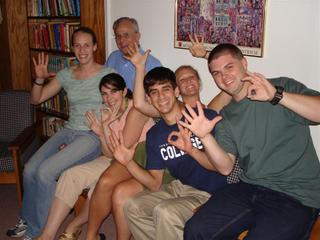103... (by Todd)
...is the number of flies I killed (with a flyswatter) today at Casa Pasionista. It's a new Passionist Volunteers record for flies killed in one day. Thought you all would like to know.
Well, to give a little background to the killing spree, I'll say this. Much of Casa Pasionista is open to the air - it's got a central atrium/garden (unroofed), which is surrounded by a covered area that has no walls. This covered area connects to the kitchen and living room. So flies can fly around at will. And sometimes, we just get a ton of them. At which point, I go nuts and start the killing.
Well, to give a little background to the killing spree, I'll say this. Much of Casa Pasionista is open to the air - it's got a central atrium/garden (unroofed), which is surrounded by a covered area that has no walls. This covered area connects to the kitchen and living room. So flies can fly around at will. And sometimes, we just get a ton of them. At which point, I go nuts and start the killing.

